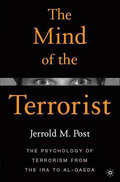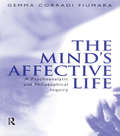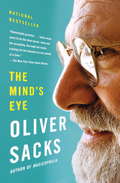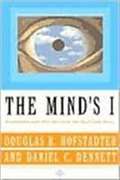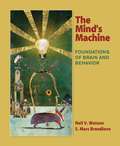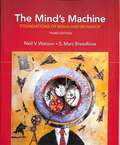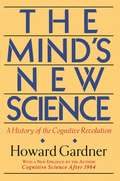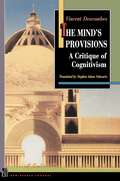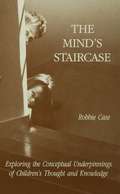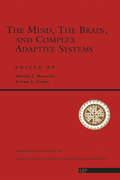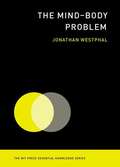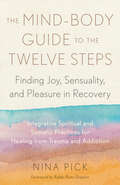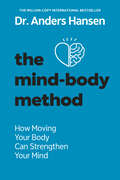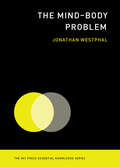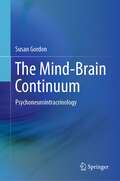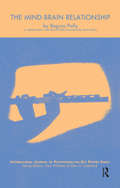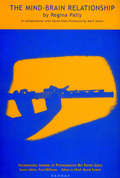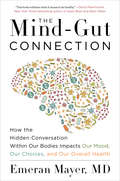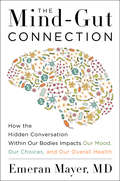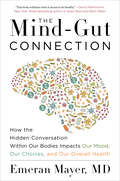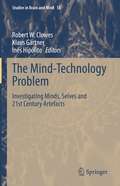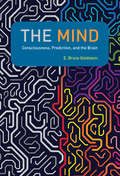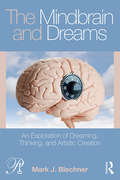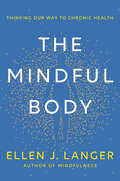- Table View
- List View
The Mind of the Terrorist: The Psychology of Terrorism from the IRA to al-Qaeda
by Jerrold M. PostIn contrast to the widely held assumption that terrorists as crazed fanatics, Jerrold Post demonstrates they are psychologically "normal" and that "hatred has been bred in the bone". He reveals the powerful motivations that drive these ordinary people to such extraordinary evil by exploring the different types of terrorists, from national-separatists like the Irish Republican Army to social revolutionary terrorists like the Shining Path, as well as religious extremists like al-Qaeda and Aum Shinrikyo. In The Mind of the Terrorist, Post uses his expertise to explain how the terrorist mind works and how this information can help us to combat terrorism more effectively.
The Mind on Paper
by David R. OlsonAlthough the importance of literacy is widely acknowledged in society and remains at the top of the political agenda, writing has been slow to establish a place in the cognitive sciences. Olson argues that to understand the cognitive implications of literacy, it is necessary to see reading and writing as providing access to and consciousness of aspects of language, such as phonemes, words and sentences, that are implicit and unconscious in speech. Reading and writing create a system of metarepresentational concepts that bring those features of language into consciousness as a subject of discourse. This consciousness of language is essential not only to acquiring literacy but also to the formation of systematic thought and rationality. The Mind on Paper is a compelling exploration of what literacy does for our speech and hence for our thought, and will be of interest to readers in developmental psychology, cognitive science, linguistics, and education.
The Mind's Affective Life: A Psychoanalytic and Philosophical Inquiry
by Gemma Fiumara CorradiThe Mind's Affective Life is a refreshing and innovative examination of the relationship between feeling and thinking. Our thoughts and behaviour are shaped by both our emotions and reason; yet until recently most of the literature analysing thought has concentrated largely on philosophical reasoning and neglected emotions. This book is an original and provocative contribution to the rapidly growing literature on the neglected "affective" dimensions of modern thought. The author draws on contemporary psychoanalysis, philosophy, feminist theory and recent innovations in neuroscience to argue that in order to to understand thought, we need to consider not only both emotional and rational aspects of thought but also the complex interactions between these different aspects. Only through such a rich and complicated understanding of modern thought can we hope to avoid what the author identifies as a significant contemporary problems for individuals and cultures; that is, suppression or denial of intolerable states of feeling. The Mind's Affective Life will appeal to and inspire students and practitioners of philosophy, psychoanalysis, psychotherapy and women's studies. It will also be of great interest to anyone interested in the interaction of feeling and thinking.
The Mind's Eye
by Oliver SacksIn The Mind's Eye, Oliver Sacks tells the stories of people who are able to navigate the world and communicate with others despite losing what many of us consider indispensable senses and abilities: the power of speech, the capacity to recognize faces, the sense of three-dimensional space, the ability to read, the sense of sight. For all of these people, the challenge is to adapt to a radically new way of being in the world. There is Lilian, a concert pianist who becomes unable to read music and is eventually unable even to recognize everyday objects, and Sue, a neurobiologist who has never seen in three dimensions, until she suddenly acquires stereoscopic vision in her fifties. There is Pat, who reinvents herself as a loving grandmother and active member of her community, despite the fact that she has aphasia and cannot utter a sentence, and Howard, a prolific novelist who must find a way to continue his life as a writer even after a stroke destroys his ability to read. And there is Dr. Sacks himself, who tells the story of his own eye cancer and the bizarre and disconcerting effects of losing vision to one side. Sacks explores some very strange paradoxes-- people who can see perfectly well but cannot recognize their own children, and blind people who become hyper-visual or who navigate by tongue vision. He also considers more fundamental questions: How do we see? How do we think? How important is internal imagery or vision, for that matter? Why is it that, although writing is only five thousand years old, humans have a universal, seemingly innate, potential for reading? The Mind's Eye is a testament to the complexity of vision and the brain and to the power of creativity and adaptation. And it provides a whole new perspective on the power of language and communication, as we try to imagine what it is to see with another person's eyes, or another person's mind.
The Mind's I: Fantasies and Reflections on Self and Soul
by Daniel C. Dennett Douglas R. HofstadterEssays from the 20th century's greatest thinkers explore topics as diverse as artificial intelligence, evolution, science fiction, philosophy, reductionism, and consciousness, presenting a variety of conflicting visions of the self and the soul.
The Mind's Machine: Foundations of Brain and Behavior
by S. Marc Breedlove Neil V. WatsonThe book introduces us to the basics of behavioral neuroscience in a way that focuses on the foundational topics in the field.
The Mind's Machine: Foundations of Brain and Behavior (Sinauer Series)
by S. Marc Breedlove Neil V. WatsonThe Mind's Machine, introduced in 2012, was written to impart the core concepts of behavioral neuroscience to students in a diverse range of disciplines, including not only psychology and the other life sciences, but art, philosophy, media studies, linguistics, and the like. <p><p>Using streamlined text, full color art, novel pedagogical features, and real life examples and analogies, The Mind's Machine, Third Edition, engages students new to neuroscience without sacrificing accuracy. This accessible, reader friendly book is appropriate for brain and behavior, biopsychology, and physiological psychology courses.
The Mind's New Science: A History of the Cognitive Revolution
by Howard GardnerThe first full-scale history of cognitive science, this work addresses a central issue: What is the nature of knowledge?
The Mind's Provisions: A Critique of Cognitivism (New French Thought Series)
by Vincent DescombesVincent Descombes brings together an astonishingly large body of philosophical and anthropological thought to present a thoroughgoing critique of contemporary cognitivism and to develop a powerful new philosophy of the mind.Beginning with a critical examination of American cognitivism and French structuralism, Descombes launches a more general critique of all philosophies that view the mind in strictly causal terms and suppose that the brain--and not the person--thinks. Providing a broad historical perspective, Descombes draws surprising links between cognitivism and earlier anthropological projects, such as Lévi-Strauss's work on the symbolic status of myths. He identifies as incoherent both the belief that mental states are detached from the world and the idea that states of mind are brain states; these assumptions beg the question of the relation between mind and brain.In place of cognitivism, Descombes offers an anthropologically based theory of mind that emphasizes the mind's collective nature. Drawing on Wittgenstein, he maintains that mental acts are properly attributed to the person, not the brain, and that states of mind, far from being detached from the world, require a historical and cultural context for their very intelligibility.Available in English for the first time, this is the most outstanding work of one of France's finest contemporary philosophers. It provides a much-needed link between the continental and Anglo-American traditions, and its impact will extend beyond philosophy to anthropology, psychology, critical theory, and French studies.
The Mind's Staircase: Exploring the Conceptual Underpinnings of Children's Thought and Knowledge
by Robbie CaseThe shortcomings of Piaget's theory of intellectual development are well-known. Less clear is what sort of theory should be devised to replace it. This volume describes the current "main contenders," including neo-Piagetian, neo-connectionist, neo-innatist and sociocultural models. Its contributors conclude that none of these models are adequate because each one implies a view of the human mind which is either too general, too particular, or too modular. A collaborative program of research -- seven years in the making -- is then described, which gives support to a newly emerging synthesis of these various positions.
The Mind, The Brain And Complex Adaptive Systems
by Harold J. MorowitzBased upon a conference held in May 1993, this book discusses the intersection of neurobiology, cognitive psychology and computational approaches to cognition.
The Mind--Body Problem
by Jonathan WestphalPhilosophers from Descartes to Kripke have struggled with the glittering prize of modern and contemporary philosophy: the mind-body problem. The brain is physical. If the mind is physical, we cannot see how. If we cannot see how the mind is physical, we cannot see how it can interact with the body. And if the mind is not physical, it cannot interact with the body. Or so it seems. In this book the philosopher Jonathan Westphal examines the mind-body problem in detail, laying out the reasoning behind the solutions that have been offered in the past and presenting his own proposal. The sharp focus on the mind-body problem, a problem that is not about the self, or consciousness, or the soul, or anything other than the mind and the body, helps clarify both problem and solutions. Westphal outlines the history of the mind-body problem, beginning with Descartes. He describes mind-body dualism, which claims that the mind and the body are two different and separate things, nonphysical and physical, and he also examines physicalist theories of mind; antimaterialism, which proposes limits to physicalism and introduces the idea of qualia; and scientific theories of consciousness. Finally, Westphal examines the largely forgotten neutral monist theories of mind and body, held by Ernst Mach, William James, and Bertrand Russell, which attempt neither to extract mind from matter nor to dissolve matter into mind. Westphal proposes his own version of neutral monism. This version is unique among neutral monist theories in offering an account of mind-body interaction.
The Mind-Body Guide to the Twelve Steps: Finding Joy, Sensuality, and Pleasure in Recovery--Integrative spiritual and somatic practices for healing from trauma and addiction
by Nina PickA trauma-sensitive companion to the Twelve Steps: body-based exercises for deepening your recovery, expanding your spiritual practice, preventing relapse, and understanding the root of your addiction. For readers of In the Realm of Hungry Ghosts and Trauma and the 12 StepsConsidering addiction through a trauma-informed lens, The Mind-Body Guide to the Twelve Steps offers an accessible, lyrical, and practical guide to Twelve Step recovery that emphasizes self-compassion, relationship, embodied awareness, and ecological connection.Whether you're suffering from an active addiction, seeking freedom from self-limiting behaviors, or hoping to establish or grow your spiritual practice, this innovative guide offers a holistic roadmap to navigating the journey of recovery.Somatic and spiritual counselor, educator, and writer Nina Pick shows how addiction is rooted in survival strategies that protect us from overwhelmingly painful experiences.Pick draws on attachment theory, polyvagal theory, somatics, mindfulness, trauma therapy, Jewish and integrative spirituality, and her own long-time experience in recovery to expand the Twelve Step practice beyond the conventional cognitive approach into one of &“soul recovery&”—a profound and sensuously embodied spiritual path.With reflections and practices designed to complement the literature and tools offered by your specific Twelve Step program, The Mind-Body Guide to the Twelve Steps shows you how to:Explore powerlessness and unmanageabilityIntegrate dance, vocalization, and other creative arts to enhance your recoveryCreate transformative ritual and ancestral healing practicesExpand your ideas of Higher Power and prayerForgive yourself and others Cultivate daily practices for reflection and meditationUnderstand the intersections of addiction, developmental trauma, and intergenerational traumaDrawing on plant medicine, mindfulness, poetry, self-directed touch, ritual, and guided imagery, The Mind-Body Guide to the Twelve Steps nurtures a joyful and heart-centered path to recovery and complements the healing work of Peter Levine, Bessel van der Kolk, and Arielle Schwartz.
The Mind-Body Method: How Moving Your Body Can Stop You Losing Your Mind
by Anders HansenINTERNATIONAL BESTSELLER • Over 1 million copies sold! • &“An essential how-to book to reduce stress, calm anxiety, and keep your brain active.&” —Nir Eyal, author of IndistractableDo you want to reduce your stress levels, boost your memory, mood, and focus, and be more creative? Then it&’s time to get moving!In this groundbreaking international bestseller, The Mind-Body Method, acclaimed psychiatrist and mental health guru Dr. Anders Hansen reveals a simple yet effective method for transforming your life: exercise. Dr. Hansen explains the evolutionary reason that exercise can reduce stress and anxiety, boost memory and focus, raise IQ, and even slow down the aging process.Drawing on his vast expertise, Dr. Hansen provides practical and concrete advice on how we can all harness the benefits of daily movement. From understanding why our brains are wired to move to motivating ourselves to achieve our health and fitness goals, The Mind-Body Method offers a life-altering approach to physical and mental well-being. Dr. Hansen is a renowned psychiatrist, well-being guru, and award-winning author whose expertise in the field has earned him international recognition as a two-time winner of the book of the year Big Health Award and Sweden&’s Mensa Prize 2018.Backed by extensive research, data, and studies spanning decades and countries, Dr. Hansen&’s insights are not only scientifically proven, but also enriched and explored through his TV series delving into the intricacies of the human brain, making him a trusted authority in the field of mental health, fitness, and overall well-being.If you&’re ready to transform your mental and physical health and unlock your full potential, The Mind-Body Method is the essential guide you need. Find out the optimal types of exercise and the duration needed to improve your attention span, memory, and overall mood.With over 1 million copies sold, this book has already been translated in 25 languages, transforming the lives of countless readers across cultures and languages.
The Mind-Body Problem (The MIT Press Essential Knowledge Series)
by Jonathan WestphalAn introduction to the mind–body problem, covering all the proposed solutions and offering a powerful new one. Philosophers from Descartes to Kripke have struggled with the glittering prize of modern and contemporary philosophy: the mind-body problem. The brain is physical. If the mind is physical, we cannot see how. If we cannot see how the mind is physical, we cannot see how it can interact with the body. And if the mind is not physical, it cannot interact with the body. Or so it seems.In this book the philosopher Jonathan Westphal examines the mind-body problem in detail, laying out the reasoning behind the solutions that have been offered in the past and presenting his own proposal. The sharp focus on the mind-body problem, a problem that is not about the self, or consciousness, or the soul, or anything other than the mind and the body, helps clarify both problem and solutions. Westphal outlines the history of the mind-body problem, beginning with Descartes. He describes mind-body dualism, which claims that the mind and the body are two different and separate things, nonphysical and physical, and he also examines physicalist theories of mind; antimaterialism, which proposes limits to physicalism and introduces the idea of qualia; and scientific theories of consciousness. Finally, Westphal examines the largely forgotten neutral monist theories of mind and body, held by Ernst Mach, William James, and Bertrand Russell, which attempt neither to extract mind from matter nor to dissolve matter into mind. Westphal proposes his own version of neutral monism. This version is unique among neutral monist theories in offering an account of mind-body interaction.
The Mind-Brain Continuum: Psychoneurointracrinology
by Susan GordonThis insightful book proposes a holistic theory of the development of self, drawing on interdisciplinary literature in existential-phenomenology, neurophenomenology, intracrinology, endocrinology, and naturopathic medicine. The psychoneurointracrine hypothesis bridges the gap between the mind and brain, providing a framework to explain the complex system that facilitates development of one’s sense of self and well-being. The book challenges assumptions in present day neuroscience and psychiatry, placing the mind and brain on a continuum of health and growth rather than reducing the study of human consciousness to neurobiological terms and pathological classifications.“In this landmark book, Susan Gordon presents a bold hypothesis, one that underscores the importance of psychoneurointracrine activity and links it to female neurology and the development of one’s sense of self. She brilliantly places this activity, which serves as a mind-body bridge, within the frameworks of neurophenomenology and non-linear dynamics. Her psychoneurointracrine hypothesis is a tour de force, one that is holistic, integrating intracrinology with psychology and neurology. This hypothesis undercuts the current assumption that the mind is an epiphenomenon of the brain, creating a paradigm that impacts science’s understanding of behavior, experience, consciousness, and human agency.”Stanley Krippner, PhD, Affiliated Distinguished Faculty, California Institute of Integral Studies, San Francisco, CA“In her fascinating book, Susan Gordon develops a novel theory about the biological connection between mind, brain, and organism. Drawing on empirical research on the role of the female hormonal system in basal states of self and mood, she shows that the biochemistry of the endocrine system must be viewed as an indispensable foundation for the emergence of embodied self-awareness. The homeostasis and hormonal balance of the organism is integral to the sense of well-being and the development of meaning, but it is also continually modulated and influenced by the subject’s experience of his or her world. She makes a decisive contribution to a theory of embodiment that goes far beyond a computational theory of the brain to focus on the biochemical-organismic processes at the root of the mind.”Thomas Fuchs, MD, PhD, Karl Jaspers Professor of Philosophy and Psychiatry, University of Heidelberg, DE
The Mind-Brain Relationship (The IJPA Key Papers Series)
by Regina PallyThis book describes how neural circuitry develops epigenetically, in a manner that directly reflects early environmental influences. It provides a systematic and comprehensive overview of the state of the art in the field, and discusses the structure and function of memory.
The Mind-Brain Relationship (The\ijpa Key Papers Ser.)
by Regina PallyThe recent explosion of knowledge in neuroscience has enormous implications for the practice of psychoanalysis, and The Mind-Brain Relationship offers an indispensable introduction to the seemingly unfamiliar, intimidating, and yet exciting and essential field of neuropsychoanalysis.
The Mind-Gut Connection: How the Hidden Conversation Within Our Bodies Impacts Our Mood, Our Choices, and Our Overall Health
by Emeran MayerCutting-edge neuroscience combines with the latest discoveries on the human microbiome to inform this practical guide that proves once and for all the inextricable, biological link between mind and body.We have all experienced the connection between our mind and our gut—the decision we made because it “felt right;” the butterflies in our stomach before a big meeting; the anxious stomach rumbling when we’re stressed out. While the dialogue between the gut and the brain has been recognized by ancient healing traditions, including Aryuvedic and Chinese medicine, Western medicine has failed to appreciate the complexity of how the brain, gut, and more recently, the microbiome—the microorganisms that live inside us—communicate with one another. In The Mind-Gut Connection, Dr. Emeran Mayer, Executive Director of the UCLA Center for Neurobiology of Stress, offers a revolutionary look at this developing science, teaching us how to harness the power of the mind-gut connection to take charge of our health.The Mind-Gut Connection, shows how to keep the communication brain-gut communication clear and balanced to:• Heal the gut by focusing on a plant-based diet• Balance the microbiome by consuming fermented foods and probiotics, fasting, and cutting out sugar and processed foods• Promote weight loss by detoxifying and creating a healthy digestion and maximum nutrient absorption• Boost immunity and prevent the onset of neurological diseases such as Parkinson’s and Alzheimer’s• Generate a happier mindset and reduce fatigue, moodiness, anxiety, and depression• Prevent and heal GI disorders such as leaky gut syndrome; food sensitivities and allergies; and IBS; as well as digestive discomfort such as heartburn and bloating• And much more.Supplemental enhancement PDF accompanies the audiobook.
The Mind-Gut Connection: How the Hidden Conversation Within Our Bodies Impacts Our Mood, Our Choices, and Our Overall Health
by Emeran MayerCombining cutting-edge neuroscience with the latest discoveries on the human microbiome, a practical guide in the tradition of Wheat Belly and Grain Brain that conclusively demonstrates the inextricable, biological link between mind and body.We have all experienced the connection between our mind and our gut—the decision we made because it “felt right”; the butterflies in our stomach before a big meeting; the anxious stomach rumbling when we’re stressed out. While the dialogue between the gut and the brain has been recognized by ancient healing traditions, including Ayurvedic and Chinese medicine, Western medicine has failed to appreciate the complexity of how the brain, gut, and more recently, the microbiome—the microorganisms that live inside us—communicate with one another. In The Mind-Gut Connection, Dr. Emeran Mayer, executive director of the UCLA Center for Neurobiology of Stress, offers a revolutionary look at this developing science, teaching us how to harness the power of the mind-gut connection to take charge of our health.The Mind-Gut Connection shows how to keep the brain-gut communication clear and balanced to:• heal the gut by focusing on a plant-based diet• balance the microbiome by consuming fermented foods and probiotics, fasting, and cutting out sugar and processed foods• promote weight loss by detoxifying and creating healthy digestion and maximum nutrient absorption• boost immunity and prevent the onset of neurological diseases such as Parkinson’s andAlzheimer’s• generate a happier mindset and reduce fatigue, moodiness, anxiety, and depression• prevent and heal GI disorders such as leaky gut syndrome, food sensitivities and allergies, and IBS, as well as digestive discomfort such as heartburn and bloating• and much more.
The Mind-Gut-Immune Connection: Understanding How Food Impacts Our Mind, Our Microbiome, and Our Immunity
by Emeran MayerCutting-edge neuroscience combines with the latest discoveries on the human microbiome to inform this practical guide that proves once and for all the inextricable, biological link between mind and body.We have all experienced the connection between our mind and our gut—the decision we made because it “felt right;” the butterflies in our stomach before a big meeting; the anxious stomach rumbling when we’re stressed out. While the dialogue between the gut and the brain has been recognized by ancient healing traditions, including Aryuvedic and Chinese medicine, Western medicine has failed to appreciate the complexity of how the brain, gut, and more recently, the microbiome—the microorganisms that live inside us—communicate with one another. In The Mind-Gut Connection, Dr. Emeran Mayer, Executive Director of the UCLA Center for Neurobiology of Stress, offers a revolutionary look at this developing science, teaching us how to harness the power of the mind-gut connection to take charge of our health.The Mind-Gut Connection, shows how to keep the communication brain-gut communication clear and balanced to:• Heal the gut by focusing on a plant-based diet• Balance the microbiome by consuming fermented foods and probiotics, fasting, and cutting out sugar and processed foods• Promote weight loss by detoxifying and creating a healthy digestion and maximum nutrient absorption• Boost immunity and prevent the onset of neurological diseases such as Parkinson’s and Alzheimer’s• Generate a happier mindset and reduce fatigue, moodiness, anxiety, and depression• Prevent and heal GI disorders such as leaky gut syndrome; food sensitivities and allergies; and IBS; as well as digestive discomfort such as heartburn and bloating• And much more.Supplemental enhancement PDF accompanies the audiobook.
The Mind-Technology Problem: Investigating Minds, Selves and 21st Century Artefacts (Studies in Brain and Mind #18)
by Inês Hipólito Robert W. Clowes Klaus GärtnerThis edited book deepens the engagement between 21st century philosophy of mind and the emerging technologies which are transforming our environment. Many new technologies appear to have important implications for the human mind, the nature of our cognition, our sense of identity and even perhaps what we think human beings are. They prompt questions such as: Would an uploaded mind be 'me'? Does our reliance on smart phones, or wearable gadgets enhance or diminish the human mind? and: How does our deep reliance upon ambient artificial intelligence change the shape of the human mind? Readers will discover the best philosophical analysis of what current and near future 21st technology means for the metaphysics of mind. Important questions are addressed on matters relating to the extended mind and the distributed self. Expert authors explore the role that the ubiquitous smart phone might have in creating new forms of self-knowledge. They consider machine consciousness, brain enhancement and smart ambient technology, and what they can tell us about phenomenal consciousness. While ideas of artificial general intelligence, cognitive enhancements and the smart environment are widely commented on, serious analysis of their philosophical implications is only getting started. These contributions from top scholars are therefore very timely, and are of particular relevance to students and scholars of the philosophy of mind, philosophy of technology, computer science and psychology.
The Mind: Consciousness, Prediction, and the Brain
by E. Bruce GoldsteinAn accessible and engaging account of the mind and its connection to the brain.The mind encompasses everything we experience, and these experiences are created by the brain--often without our awareness. Experience is private; we can't know the minds of others. But we also don't know what is happening in our own minds. In this book, E. Bruce Goldstein offers an accessible and engaging account of the mind and its connection to the brain. He takes as his starting point two central questions--what is the mind? and what is consciousness?--and leads readers through topics that range from conceptions of the mind in popular culture to the wiring system of the brain. Throughout, he draws on the latest research, explaining its significance and relevance.
The Mindbrain and Dreams: An Exploration of Dreaming, Thinking, and Artistic Creation (Psychoanalysis in a New Key Book Series)
by Mark J. BlechnerIn The Mindbrain and Dreams: An Exploration of Dreaming, Thinking, and Artistic Creation, Mark J. Blechner argues that the mind and brain should be understood as a single unit – the "mindbrain" – which manipulates our raw perceptions of the world and reshapes that world through dreams, thoughts, and artistic creation. This book explores how dreams are key to understanding mental processes, and how working with dreams clinically with individuals and groups provides an essential route towards achieving transformation within the psychoanalytic process. Covering such key topics as knowledge, emotion, metaphor, and memory, this book sets out a radical new agenda for understanding the importance of dreams in human thought and their clinical importance in psychoanalysis. Blechner builds on his previous work and takes it much further, drawing on the latest neuroscientific findings to set out a new way of how the mindbrain constructs reality, while providing guidance on how best to help people understand their dreams. The Mindbrain and Dreams: An Exploration of Dreaming, Thinking, and Artistic Creation will appeal to psychologists, psychoanalysts, philosophers, and cognitive neuroscientists who want new ways to explore how people think and understand the world.
The Mindful Body: Thinking Our Way to Chronic Health
by Ellen J. LangerLearn how adjusting your thoughts can change your health—from the &“mother of mindfulness&” and first female tenured professor of psychology at Harvard.&“What matters more: mind or body? Filled with original research and thought-provoking insights, The Mindful Body shows that the two are not just connected but are actually one, opening us to vast potential for health and happiness.&”—Dan Ariely, New York Times bestselling author of Predictably IrrationalCan changing your thoughts improve your health? We tend to live our lives as though our ailments—our stiff knees or frayed nerves or diminished eyesight—can change only in one direction: for the worse. Award-winning social psychologist Ellen J. Langer&’s life&’s work proves the fault in this negative outlook as well as the healing power of its alternative: mindfulness—the process of active noticing where we are not bound by past experience or conventional wisdom. In The Mindful Body, Dr. Langer unpacks her assumption-busting findings and outlines her bold new theory of mind-body unity, along the way clearly demonstrating how our thoughts and perspectives have the potential to profoundly shape our well-being. Whether it is hotel chambermaids who lost weight when they simply came to see that their work constituted exercise, or patients whose wounds healed faster in rooms with accelerated clocks, she shows how influential our thoughts are to the state of our bodies. Her work has likewise proven that discouraging health news can have negative effects. Learning you are prediabetic, for example—even if your blood sugar reading is only a fraction away from &“normal&”—may actually play a part in the development of the disease. A paradigm-shifting book by one of the great psychologists of the twenty-first century, The Mindful Body returns the control over our bodies back to us and reveals that a true understanding of health begins with our minds.
